A Conversation on Indonesia's Foreign and Economic Policies
Ambassador Dino Patti Djalal
Photos | Transcript
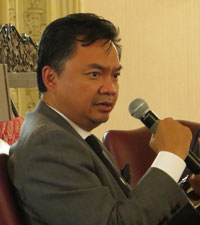
Washington, DC—On May 6, 2013, H.E. Dr. Dino Patti Djalal, Ambassador of Indonesia to the United States, addressed WFPG at an Embassy Series event on “Indonesia’s Foreign and Economic Policies” moderated by WFPG President Patricia Ellis. The Ambassador discussed Indonesia’s democratic transition and the lessons it might hold for other countries trying to build sustainable post-authoritarian systems. His remarks emphasized Indonesia’s democratic “soft power,” its strong relationship with the United States, and its unique role, as a moderate Muslim nation, in facilitating productive conversations among diverse groups of stakeholder nations, both within Southeast Asia and across the broader region.
The Ambassador traced the trajectory of Indonesia’s transition from its beginnings in 1998, through the flawed founding elections of 1999, and up to the consolidation of the new democratic system at subsequent elections in 2004 and 2009. Thanks to thoughtful leadership, the commitment of reformers, productive buy-in from old-regime stakeholders, and ambitiously sequenced institutional reforms, democracy has become a habit in Indonesia. The reform process has, in the Ambassador’s words, “reached a point of no return.”
The success of Indonesia’s transition suggests that democracy is compatible with rapid development, with ethnic and religious diversity, and with Islam. Indonesia’s GDP grew by 6.5% in 2012, it is one of the most ethnically diverse nations in the world, and it is the world’s largest Muslim country by population. In fact, according to the Ambassador, Islamic political parties have been some of the most enthusiastic participants in Indonesia’s parliamentary processes. The Ambassador noted that Indonesia’s experience as a successful Muslim-majority democracy could be particularly useful to the nations of the Middle East as they democratize in the wake of the Arab Spring revolutions.
Ambassador Djalal also commented on some of Indonesia’s domestic challenges. Although public support for democracy generally remains strong, confidence in the ability of particular governmental institutions to function is still relatively weak. This disconnect may reflect broader accountability concerns linked to pervasive corruption; the Ambassador believes it will take 10–15 years to make corruption “the exception rather than the rule” in Indonesia. Another potential danger involves “elitist politics,” whereby elected officials rule in ways increasingly remote from the daily concerns of the people they represent. These issues look particularly worrisome in the context of growing economic inequality—especially within cities and between urban and rural areas.
Terrorism remains a serious threat, but, since the 2002 Bali bombings, Indonesia has made great progress in preventing attacks: with assistance from the United States and Australia, the country has established a highly effective anti-terrorism unit and pursued policies intended to empower moderate religious voices. Reformers in the Indonesian government have made deliberate efforts to ensure that human rights and democratic values are respected in the context of the fight against terrorism. The balancing act has been successful so far: according to the Ambassador, Indonesia has “one of the best law-enforcement records in Asia,” and “hundreds of terrorists are in jail”—all while the democratic system continues to function well.
Ambassador Djalal also discussed Indonesia’s role in promoting democracy in Southeast Asia and around the world. The country’s leaders have developed both formal and informal frameworks of personal consultation with non-democratic regimes. In the case of Myanmar, for example, they “found that the leadership was quite sensitive about being told about what to do with their democracy by fellow Southeast Asian leaders,” and built on that discovery to advise Myanmar’s generals on the direction and pace of their country’s democratic reforms. Indonesian leaders have also established a multilateral continent-wide discussion group, the Bali Democracy Forum, which brings together some eighty states to share “best practices and lessons learned” as they work, “without pressure,” toward more democratic outcomes.
The Ambassador also underlined the importance of the Comprehensive Partnership between the United States and Indonesia. As Indonesia works to extend access to high-quality education to all of its citizens, the numbers of Indonesian students studying abroad in the United States have dropped dramatically. The Ambassador called for a particular effort from both nations to facilitate academic exchange and to improve bilateral cooperation on education more generally. The US–Indonesia relationship in other areas is already very strong, and for good reason: as the Ambassador emphasized throughout the evening, Indonesia is a diverse, rapidly developing, and vibrant democracy, deeply engaged in helping to create a region at peace.
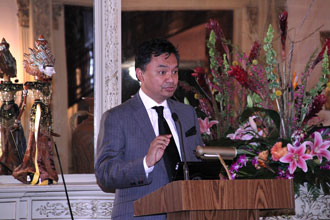 |
 |
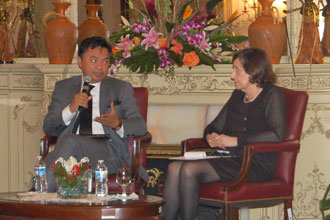 |
|
Ambassador Dino Patti Djalal of Indonesia addresses
WFPG members and guests
|
|
Ambassador Djalal engages in discussion with
WFPG President Patricia Ellis
|
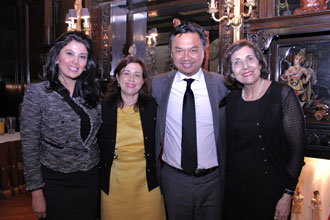 |
 |
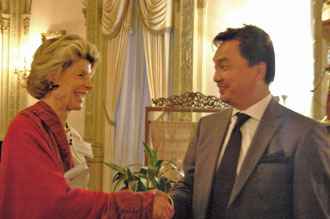 |
|
Rosa Djalal, Under Secretary of State
Tara Sonenshine, Ambassador Djalal, and Patricia Ellis
|
|
Board Member Diana Villiers Negroponte speaks
with Ambassador Djalal
|
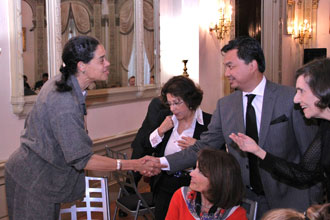 |
 |
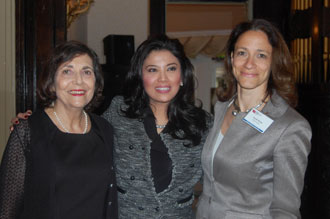 |
|
Board Member Gail Leftwich Kitch
greets Ambassador Djalal
|
|
Patricia Ellis, Rosa Djalal, and
Board Member Sarah Kahn
|
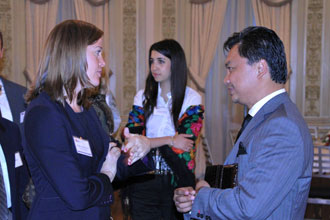 |
 |
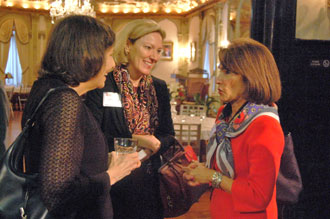 |
|
Board Member Brigitte Schmidt Gwyn
speaks with Ambassador Djalal
|
|
Patricia Ellis, Board Member Carolyn Brehm,
and Ronna Freiberg
|
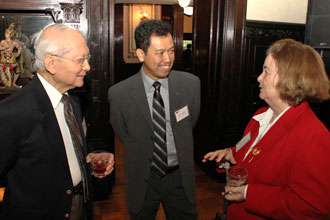 |
 |
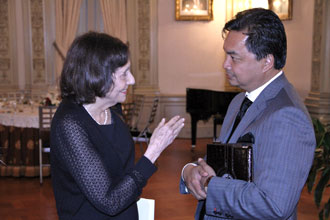 |
|
Board Member Dawn Calabia and Tino Calabia speak
with Indonesian Minister Counselor Heru Subolo
|
|
Ambassador Djalal and Patricia Ellis
|
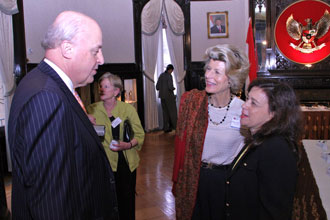 |
 |
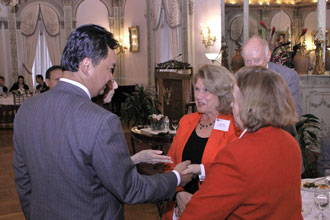 |
|
Ambassador John Negroponte, Diana Negroponte,
and Under Secretary Sonenshine
|
|
Ambassador Djalal with Anita Botti of the
Department of State and Dawn Calabia
|
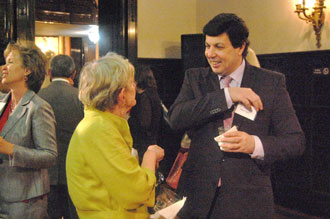 |
 |
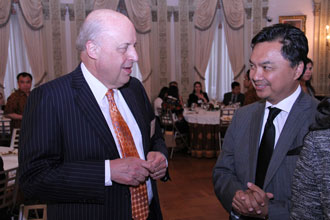 |
|
Ambassador Abdallah Baali of Algeria
|
|
Ambassador John Negroponte with Ambassador Djalal
|
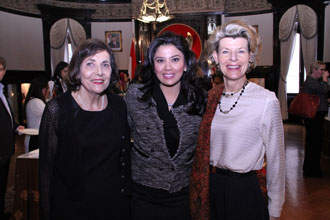 |
 |
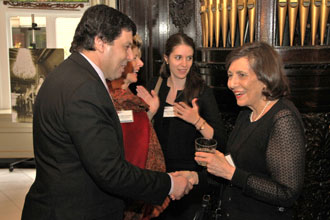 |
|
Patricia Ellis, Rosa Djalal, and Diana Negroponte
|
|
Ambassador Baali with Patricia Ellis and
WFPG Associate Director Kimberly Kahnhauser
|
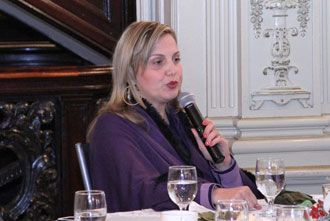 |
 |
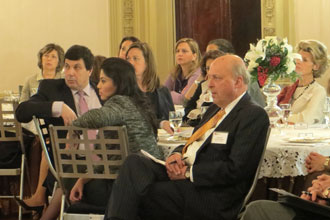 |
| |
|
|
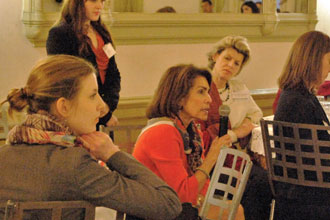 |
 |
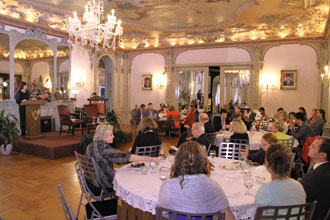 |
| |
|
|
|
|